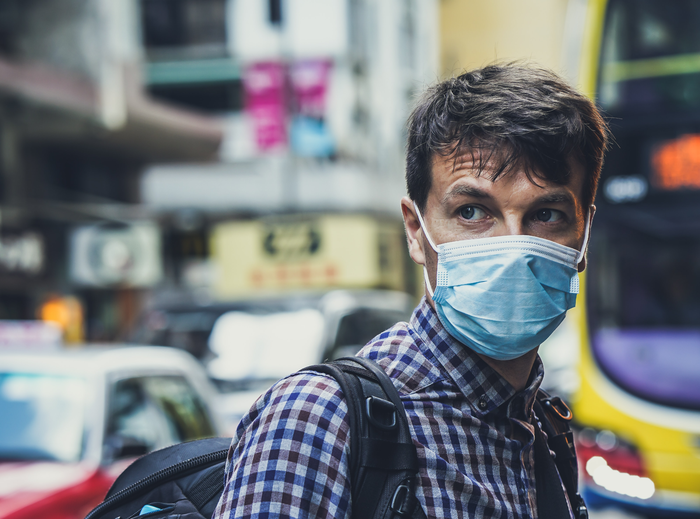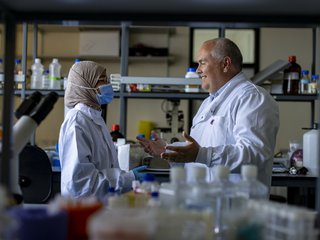How dangerous is Covid-19 for people with blood cancer?
New research has been published that sheds new light on how dangerous the coronavirus is to people with blood cancer.

At the start of the pandemic, lots of people with blood cancer (which includes leukaemia, lymphoma and myeloma) were told they are “clinically extremely vulnerable” to the coronavirus.
Since then, research has been published that has suggested blood cancer increases your risk from Covid by more than almost any other health condition. But much of that research has been based on quite small numbers of people.
Now, scientists have published a new study that has pulled all the separate studies published on blood cancer into what’s called a “meta-analysis”. This means that by putting the data from the 3,377 people included in all the separate studies, the researchers have created one big study that can give a clearer picture than we can get from looking at any single study on its own.
Making the decision to publish this article
Within Blood Cancer UK, we’ve thought carefully about whether we should write a blog that summarises its findings. Every day, we hear from people with blood cancer who are feeling anxious about the pandemic, and the last thing we want to do is add to that anxiety. We also know that while lots of people have found our previous blogs on the coronavirus informative, to some they have felt like yet more bad news.
But we’ve decided to publish this article for two reasons:
- While for many people affected by blood cancer, this will just be repeating or adding detail to what they already know. But we hope it reaches some people with blood cancer who may not be aware of what the research says on this.
- We get the sense from parts of government and the NHS that the message hasn’t really hit home about just why it’s so important that people with blood cancer get the support they need to protect them from Covid.
What does this latest study tell us?
The results of the study confirm what other studies have already suggested: while most people with blood cancer who get the coronavirus survive, the proportion of them who die is much higher than for the general population.
Of all the people with blood cancer included in this study who got coronavirus, 34% died. But it’s important to emphasise that this isn’t someone with blood cancer’s chance of dying if they get the virus.
The real death rate will be lower than this, because much of the research has only included people who were unwell enough to have needed hospital treatment. This means that anyone with either mild symptoms or no symptoms at all would have been unlikely to have been included.
But while we don’t know the real death rate of coronavirus in people with blood cancer, the authors of the study looked at a general population of people in hospital with Covid, and about 22% of these people died. So this suggests that, looking just at the people who have to go to hospital, someone with blood cancer is roughly 50% more likely to die than someone who doesn’t have it.
But the big unanswered question is what proportion of people with blood cancer who get Covid only get mild symptoms. Right now, we have no idea at all. But the high death rate in hospital reinforces how important it is for people with blood cancer to avoid coming into contact with Covid.
Does the type of blood cancer make a difference?
As well as looking at overall death rate, the study also looked at how the death rate differed depending on the type of blood cancer the person has. While these figures suggest that risk does vary depending on your type of blood cancer, someone with blood cancer’s risk seems to be high whatever type they have.
The study also suggests age that is an important risk factor, with people in the study aged over 60 much more likely to die if they got Covid than people aged under 60. But we don’t know how age differs as a risk factor depending on which type of blood cancer you have. For example, a study last year suggested that for CLL, age didn’t seem to be as big a risk as we might have expected.
How does covid-19 affect children with blood cancer?
The study also looked at what happens to children with blood cancer who get Covid. Of the children in the study, 4% died.
Any death of a child is an appalling tragedy, but we hope that these results at least give parents of children with leukaemia or lymphoma some reassurance that the death rate in children with blood cancer is much lower than in adults.
People from BAME backgrounds
We know that the pandemic has disproportionately affected people from BAME backgrounds. This study has also found worrying evidence that looking at people with blood cancer who get Covid, the death rate is higher for people from BAME communities than for white people. But these are just headline figures, and so they do not tell us why this might be the case. And because it’s a global study, we don’t understand if the same trend has happened here in the UK.
In conclusion...
This study confirms that people with blood cancer are at significantly higher risk from the coronavirus. This means it is really important that people with blood cancer are protected from the virus and we have a page on our website about how to make sure you get a vaccine if you have blood cancer.
We know this is a tough time for people with blood cancer, and we understand this can be an upsetting subject. If you feel worried about what you’ve read or have further questions, please call our support line on 0808 2080 888.
We will continue to email our community when new research is published on the coronavirus and blood cancer. If you’d like to get these emails, sign up to our e-newsletter below.

Sign up to our enewsletter to stay updated on our progress
Join our mailing list to keep updated about the latest news, research, and the ways you can help – including campaigns and events that you might be interested in.
